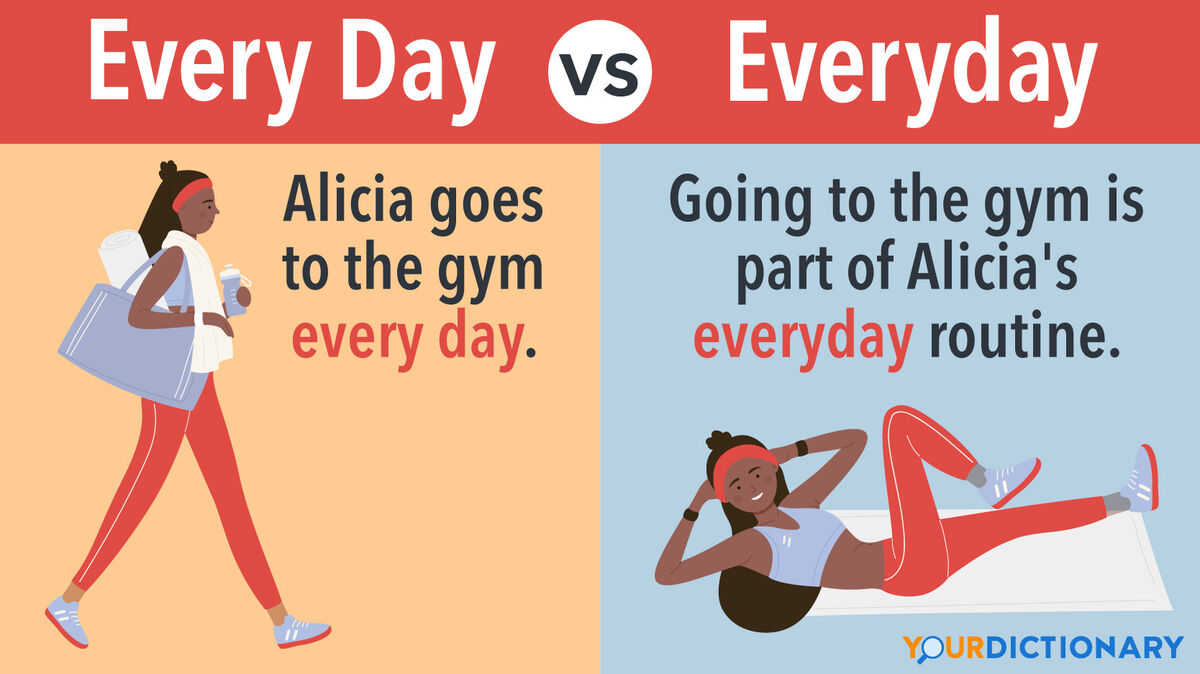
Do you play basketball everyday or every day? Does that make it an "everyday activity" or an "every day activity"? It may seem like that one little space is the only difference between these words, but the way you use each in a sentence is very different. Learn when you should use every day vs. everyday and how the words are not interchangeable at all.
Every Day vs. Everyday: The Difference Explained
The difference between every day and everyday is actually quite simple. One indicates that you do something each day and the other suggests something is common in your regular life.
every day - each day; on a daily basis
everyday - occurring or used daily; common
Tips to Remember the Difference
If you’re writing the word everyday or every day but are not sure if you used the correct term, remember these quick tricks.
- If you can replace the word with regular, use everyday.
- If you can replace it with each day, use every day.
- When all else fails, say the sentence out loud. Your speech will automatically pause when saying every day, and it likely won't if the correct answer is everyday.
Every Day: Meaning and Usage
Every day is a phrase that means one thing: "each day." The adjective every modifies the noun day. It can be used as a noun phrase when it functions as a noun, such as:
Every day is better than the last one.
Every day offers new opportunities.
Every day shows us the possibility of life.
However, every day is more commonly used as an adverbial phrase. It modifies the verb to answer the question "when" or "how often."
Every Day Sentence Examples
The phrase every day is used ... well, every day to describe daily activities and routines.
I order the same spinach salad every day. (When do you order it?)
Tammy gets to work early every day. (When does she get to work early?)
Our team has to meet every day this week to finish the project. (How often does our team have to meet?)
Every day, I write my wife an email to tell her that I love her. (How often do you write an email?)
Because adverbial phrases describe verbs, it's easy to mistake them for adjectival phrases. But like adjectives, adjectival phrases describe nouns, not verbs. That's where everyday comes in.
Everyday: Meaning and Usage
Everyday is a compound word that functions as an adjective. You use it before a noun, not after, to describe something that is regular or common. That's the easiest way to tell the difference between everyday and every day.
Everyday Sentence Examples
Everyday is used to describe regular or commonplace items or occurrences. Some examples include:
These are my everyday shoes. (modifies the noun shoes)
Helping people is an everyday task for emergency room doctors. (modifies the noun task)
Taking a vacation is a great way to escape everyday life. (modifies the noun life)
Becky's everyday makeup includes a light eyeshadow and lip tint. (modifies the noun makeup).
When combined with a noun, everyday can become the adjective in a noun phrase (such as "everyday shoes"). But by itself, everyday can only function as an adjective.
Choosing Between Every Day and Everyday
When deciding whether to use every day or everyday, that space makes a big difference in both writing and speech. When you say every day, the words are spaced out and pronounced individually, while everyday is pronounced like one word with no breaks.
Here are some correct and incorrect examples of each word in context. Check out when each word is used appropriately.
Correct | Incorrect |
Alicia goes to the gym every day. | Alicia goes to the gym everyday. |
Going to the gym is part of Alicia's everyday routine. | Going to the gym is part of Alicia's every day routine. |
My neighbor playing his music too loud is an everyday occurrence. | My neighbor playing his music too loud is an every day occurrence. |
My neighbor plays his music too loud every day. | My neighbor plays his music too loud everyday. |
Golden retrievers are very active and should be walked every day. | Golden retrievers are very active and should be walked everyday. |
Golden retrievers are very active and need an everyday walk. | Golden retrievers are very active and need an every day walk. |
Every day presents a new challenge at Laura's new job. | Everyday presents a new challenge at Laura's new job. |
More Noun Phrase and Adjective Confusion
It's important to know when to use every day vs. everyday, just in case your spellcheck doesn't catch the error. Understanding how to use noun phrases and adverbial phrases is an important part of any grammar lesson. For more tips to help your spelling, check out the difference between anymore vs. any more. Another similar debate is the use of apart vs. a part. You can also learn whether you should offer help anytime or any time.